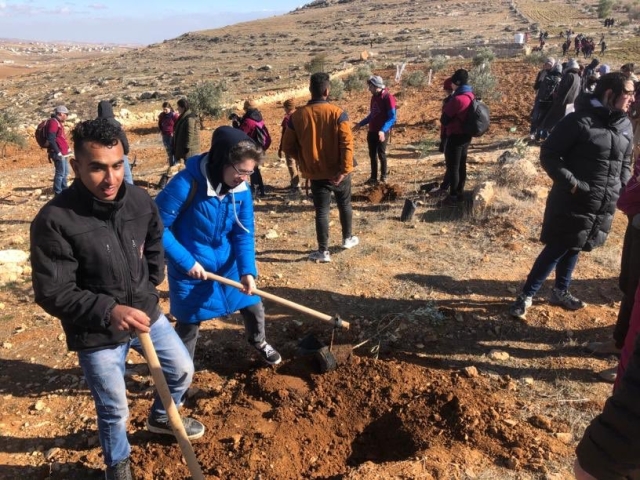The Israeli residents of Elazar in the Gush Etzion region, woke up Sunday morning to find around 400 trees encircling the settlement’s borders. These new trees are all part of a well-planned project to prevent Israeli residential areas from expanding any further. Just last week, over 230 trees were planted around Neve Daniel, also within Gush Etzion.
Behind this activity is a Palestinian-funded organization called "The Arab Group for the Protection of Nature." The peculiar name considering the toxic garbage pits that are regularly burned by Palestinians describes an organization that fights for the preservation of the environment, but it turns out that its founders and funding sources have other goals.
עוד 400 עצי פרי נשתלו מחוץ ליישוב אלעזר ע"י אותו ארגון, כחלק מהמלחמה על השטח.
— מאבק על כל דונם (@Mavakalkoldunam) December 1, 2022
למה דווקא גוש עציון?
המטרה שלהם להשתלט ולחנוק את סביבת ירושלים ולעשות רצף טריטואלי מדרום ועד צפון. השתלטות על גוש עציון מביאה להם חיבור ישיר בין חברון לירושלים ומונעת מהיהודים להתרחב באזור. https://t.co/hUGj2qDDlk pic.twitter.com/qZbx7VwShX
During a video uploaded by the organization in which the activists are seen planting new trees in Gush Etzion, some can be heard saying "the trees will remain a bone in the throats of the settlers". According to the organization's announcements just this past October, its workers planted just over 4,240 trees in Gush Etzion alone.
In a recent forum called “Fight For Every Dunam” hosted by pro-Israel activists, it was said "the choice of the invaders to plant thousands of trees precisely in Gush Etzion is not accidental. Their goal is to take over and suffocate the surroundings of Jerusalem and make a territorial succession from south to north. Taking control of Gush Etzion brings them a direct connection between Hebron and Jerusalem and prevents Israelis from expanding in the area. If we don't wake up, the Arabs will continue to come with trees near the Jewish settlements, while we sit idly by behind the fence."
Palestinian construction and assimilation in Israeli settlement lands manifest themselves through agricultural crops precisely at strategic points in Judea and Samaria. It is all a part of a systematic plan initiated by the former Palestinian Prime Minister Salam Fayyad, who stated that the creation of a sequence of construction between Arab settlements will both create discontinuities between Israeli settlements in Judea and Samaria and will also lead to a de-facto Palestinian state even if not declared.
כבר שבת שניה שמגיעים פלסטינים לגבול הישובים אלעזר ונווה דניאל בגוש עציון ושותלים מאות שתילים. הנוטעים מגיעים מטעם "החברה הערבית להגנת הטבע", אבל גם הם עצמם מודים שהמטרה היא ש"העצים יישארו עצם בגרונם של המתנחלים" ולמנוע את התרחבות הישובים הללו בעתיד @MakorRishon pic.twitter.com/Q7XAtFKohN
— שילה פריד (@shilofreid) December 4, 2022
In addition to the statehood visions for these plantings, they are fruit trees that are picked often by local Arabs, causing incitement and friction. Mass harvesting events are common in Arab communities and when near Israeli territory, clashes between Jews and Arabs often break out, ending with IDF soldiers breaking up the fighting.
Israel's indecisiveness in building up Area C land which is in its control and where most Israeli communities in Judea & Samaria exist has been a problem. Many communities have limited space and enough allocated land to expand, however, freezes on construction by the government have hindered their growth while giving Palestinians the ability to take over land that has not yet been developed.


